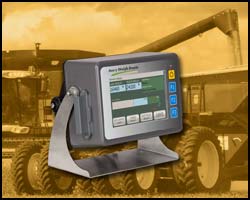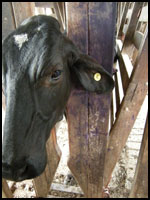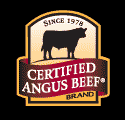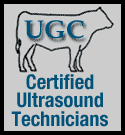New Products
Grain-cart weighing system
Avery Weigh-Tronix has introduced the Field Foreman grain-cart software, specifically developed for the company's model 3060 touch-screen indicator. The indicator easily interfaces with virtually any brand of load cell or weigh bar.
 Enhanced with the optional Field Linx software, a Windows®-based PC program, grain-cart software operators can manage data from multiple 3060 indicators from one PC, eliminating redundant data entry and management.
Enhanced with the optional Field Linx software, a Windows®-based PC program, grain-cart software operators can manage data from multiple 3060 indicators from one PC, eliminating redundant data entry and management.
The Field Linx software easily translates data into custom reports, with the option to export data to Excel or XML formats for use in other PC applications. Together, the two software systems can help streamline the process to establish average production history (APH) and provide additional proof of yields documentation for Federal Crop Insurance.
This creates an accurate system to track APH and field performance, producing an instant record at the conclusion of harvest and eliminating the need to wait until the grain is hauled and weighed at the end user to establish production numbers for the year. If a producer needs to file a claim with Federal Crop Insurance, the grain-cart software records assist in the process of organizing and allocating scale tickets and settlement statements to fields.
A grain-cart weighing system also prevents overloading of delivery trucks, which, in turn, eliminates the risk of overload fines. Prior to harvest, operators can enter tare and target gross weights of each delivery truck to ensure the truck's weight remains within the legal gross weight. The software then indicates when the truck has reached capacity.
Additionally, Field Foreman can be set up to send an output signal that can control the auger wagon's gate to cut off the flow of grain when the target is met.
Additional features of the grain cart software include simple entry of field, grain type, hybrid, delivery truck and location data; analyze yield performance per hybrid/test plot through customized, detailed field reports; track where grain is delivered by selecting from a list of user-defined delivery locations; and verify and calibrate combine yield monitor.
For more information visit http://agscales.com.
New name for spray oil emulsion
Brandt has announced that Saf-T-Side® is getting a new name and look. Beginning in October, the product will be marketed under its new name, TriTek.™ The new name is derived from the product's unique properties and function as a 3-in-1 fungicide-insecticide-miticide spray oil emulsion.
After 25 years on the market, the product has a reputation of providing effective, long-lasting insect and disease control, and, the company says, it is recommended by leading universities as an essential component of integrated pest management (IPM).
TriTek is OMRI listed and approved for use in organic production. The highly refined, pre-emulsified paraffin oil is manufactured using proprietary company technologies. The result is a stable, creamy emulsion that evenly coats plants and stays on leaves longer, with minimal run off.
For more information visit www.brandt.co.
Ceitec S.A., a Brazilian company that develops and produces application-specific integrated circuits (ASICs) has announced that it has reached volume production for the first semiconductor device designed in-house. The device, Chip do Boi, is an advanced low-frequency-radio frequency identification (LF-RFID) device designed for use in Brazil's cattle industry as part of a leading-edge system to track livestock. ID device
ID device
The device is being manufactured at X-Fab Silicon Foundries in Germany. The company has announced that two more RFID chips are undergoing performance tests and will go into volume production in 2012.
For more information visit www.ceitec-sa.com.
Using gypsum to replenish soils for crops
GypSoil has highlighted several studies that show lower levels of sulfur in soils in Wisconsin and other states to promote the addition of FGD byproduct gypsum to fields. The gypsum is produced at certain coal-fired utility plants that use scrubbing technology to clean emissions. In addition to FGD gypsum, coproduct gypsum is derived from fermenting corn for food products.
The company says before environmental regulations restricted sulfur emissions, farmers got sulfur from rain, and never worried about adding it to fields. Now farmers can recycle the gypsum that would go into landfills to supply plant fertility needs.
FGD gypsum supplies approximately 13%-16% sulfur and 17%-20% calcium on a dry weight basis, according to Ron Chamberlain, chief agronomist and founder of GypSoil, who now serves as director of gypsum programs for Beneficial Reuse Management. In addition to supplying soils with calcium and sulfur, gypsum is also used by many growers as a soil amendment to improve water infiltration, reduce erosion and keep nutrients like phosphorus from leaching out of the soil.
Chamberlain says FGD or byproduct gypsum is an ideal sulfur source because it is cost-effective, readily available and easy to apply with bulk spreaders used to apply litter or lime. He suggests the rate for gypsum application on alfalfa ground is 300-500 pounds (lb.) per acre, though some growers elect to apply it at a higher rate to achieve soil amendment benefits, as well.
For more information visit www.gypsoil.com.
Company unveils lineup of "efficient power" equipment
Case IH Agriculture has introduced its Axial-Flow® 30 Series combines, Patriot® 4430 sprayer and Maxxum® tractors, a family of high-horsepower (hp) equipment utilizing the company's Efficient Power technologies.

Efficient Power equates to equipment and technology that is powerful, smart and simple. The company says it will use exclusively its Selective Catalytic Reduction (SCR) technology that helps meet Tier 4 emission requirements, but also improves engine responsiveness and can reduce fuel consumption by 10%, on average.
The Efficient Power family will expand in late 2012 with the Magnum 370 CVT tractor, the highest hp mechanical front-drive (MFD) tractor on the market at 419 maximum boosted engine hp.
For more information visit www.caseih.com/en_us/Pages/Home.aspx.










